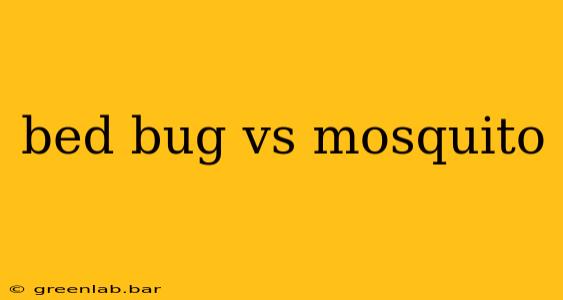Both bed bugs and mosquitoes are unwelcome nighttime visitors known for their bites, but they differ significantly in appearance, behavior, and the diseases they transmit. Understanding these differences is crucial for effective pest control and protecting your health. This article will delve into a detailed comparison of bed bugs and mosquitoes, highlighting key distinctions to help you identify and address these pests effectively.
Physical Appearance: Spotting the Differences
Bed Bugs: These tiny insects are oval-shaped and typically range from 1 to 7 millimeters in length. Their color varies from reddish-brown to dark brown, and they lack wings. Newly hatched bed bugs are smaller and paler. Their bodies are flat, allowing them to easily hide in crevices.
Mosquitoes: Mosquitoes are slender insects with six long legs, a long proboscis (a needle-like mouthpart), and a pair of wings. Their size varies depending on species, but they are generally larger than bed bugs, typically measuring 3 to 6 millimeters in length. Mosquitoes' bodies can be a variety of colors, including brown, gray, black, and even some with metallic hues.
Habitats and Behavior: Where They Live and How They Bite
Bed Bugs: Bed bugs are nocturnal creatures that primarily feed on human blood. They live in mattresses, box springs, bed frames, and other areas close to sleeping humans. During the day, they hide in cracks and crevices, emerging at night to feed. They don't fly.
Mosquitoes: Mosquitoes are also blood-feeding insects, but their habitats are far more diverse. They breed in standing water, such as puddles, ponds, and containers holding water. Some species are active during the day, while others are primarily nocturnal. Unlike bed bugs, most mosquitoes are capable of flight, which dramatically increases their range.
Bites and Reactions: Understanding the Differences
Bed Bugs: Bed bug bites are often painless at the time they occur. However, they typically result in itchy welts that appear in clusters or lines. Reactions vary, with some individuals experiencing minimal discomfort while others develop severe allergic reactions.
Mosquitoes: Mosquito bites also cause itchy welts, but they usually involve a single puncture point. The immediate reaction might include a small red bump and swelling. Some people experience a more significant allergic reaction, while others show minimal symptoms.
Diseases Transmitted: Health Risks
Bed Bugs: While unpleasant, bed bugs are not known to transmit diseases. Their primary nuisance is the intense itching and potential for secondary skin infections caused by scratching.
Mosquitoes: Mosquitoes are vectors for a range of serious diseases, including malaria, Zika virus, West Nile virus, dengue fever, and yellow fever. These diseases can cause a wide range of symptoms, from mild fever and rash to severe illness and even death.
Prevention and Control: Keeping Them Away
Bed Bugs: Prevention involves thorough cleaning, using mattress encasements, and employing professional pest control services if an infestation occurs.
Mosquitoes: Prevention strategies include eliminating standing water, using mosquito nets, applying insect repellent, and using mosquito traps. Professional pest control services may also be necessary for significant infestations.
Summary Table: Bed Bugs vs. Mosquitoes
| Feature | Bed Bugs | Mosquitoes |
|---|---|---|
| Size | 1-7 mm | 3-6 mm |
| Appearance | Oval, reddish-brown to dark brown, wingless | Slender, various colors, winged |
| Habitat | Mattresses, bed frames, crevices | Standing water, vegetation |
| Activity | Primarily nocturnal | Day or night, depending on the species |
| Bites | Painless initially, itchy welts in clusters | Itchy welt at a single puncture point |
| Disease Transmission | No | Yes (various diseases) |
By understanding the key differences between bed bugs and mosquitoes, you can take appropriate steps to protect yourself and your family from these unwanted pests and the potential health risks they pose. Remember to always consult with a healthcare professional if you experience concerning symptoms after a bite.

